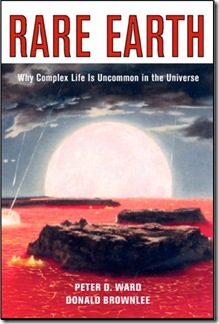Written by a pair of professors at the University of Washington, Rare Earth is a polemic for the view that complex life, both animals and higher planets, is rare in the Milky Way Galaxy and perhaps even in the Universe. Thus, the authors contend that there could be many, perhaps millions, of planets scattered throughout the Galaxy on which single-celled microorganisms thrive. On only a handful of planets, perhaps only one, would the air be filled with flying creatures and the ground covered with creepy or crawly things.
Cast in terms of the Drake equation, the authors believe that fl, the probability that life will originate on a habitable planet, could approach unity (1). However, they argue that fh, the fraction of planets that are habitable, and fi, the probability that intelligent life will develop on a planet on which life has emerged, are individually or both probably quite close to 0. Thus, the total number of technological civilizations in the Galaxy would be small, perhaps only one. (However, they also mis-characterize the Drake equation as assuming that "once life originates on a planet, it evolves toward ever higher complexity." As the Drake equation contains a factor fi there is clearly no assumption in the Drake equation itself that life "evolves toward ever higher complexity.")
The authors bring to bear a number of different aspects of the Earth's astrophysical, geological, and biological history, some of them fairly recently appreciated, to support their argument. Among these aspects are
- A Galactic habitable zone, the possibility that habitable planets can only exist in a restricted region of the Galaxy,
- A temporal habitable zone, based on the fact that a star's luminosity gradually increases over time meaning that in 1 billion years or so the Sun will boil away the Earth's oceans,
- The presence of a comet-slaying giant planet to reduce considerably the number of comets that strike a habitable planet, like Jupiter in our solar system,
- The "snowball" Earth hypothesis, that on at least two occasions the Earth's oceans may have largely or entirely frozen over, and
- The time between the first appearance of life on this planet and the Cambrian explosion when the diversity of life exploded and animal life first appeared.
It has been this reviewer's experience that reading well-written apologies of a position with which one disagrees can often make one sharpen one's arguments. Rare Earth cannot be put in this category. I found it not only to be not convincing, but not particularly thought provoking and in some places sloppy almost to the point of being wrong. (click for full review)
http://rapidshare.com/files/118967532/kitap23.rar (2328 KB, şifre: 23kitap17711)




No comments:
Post a Comment